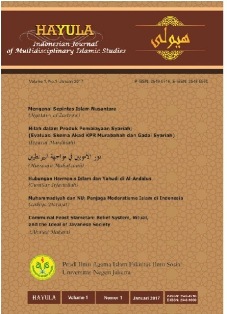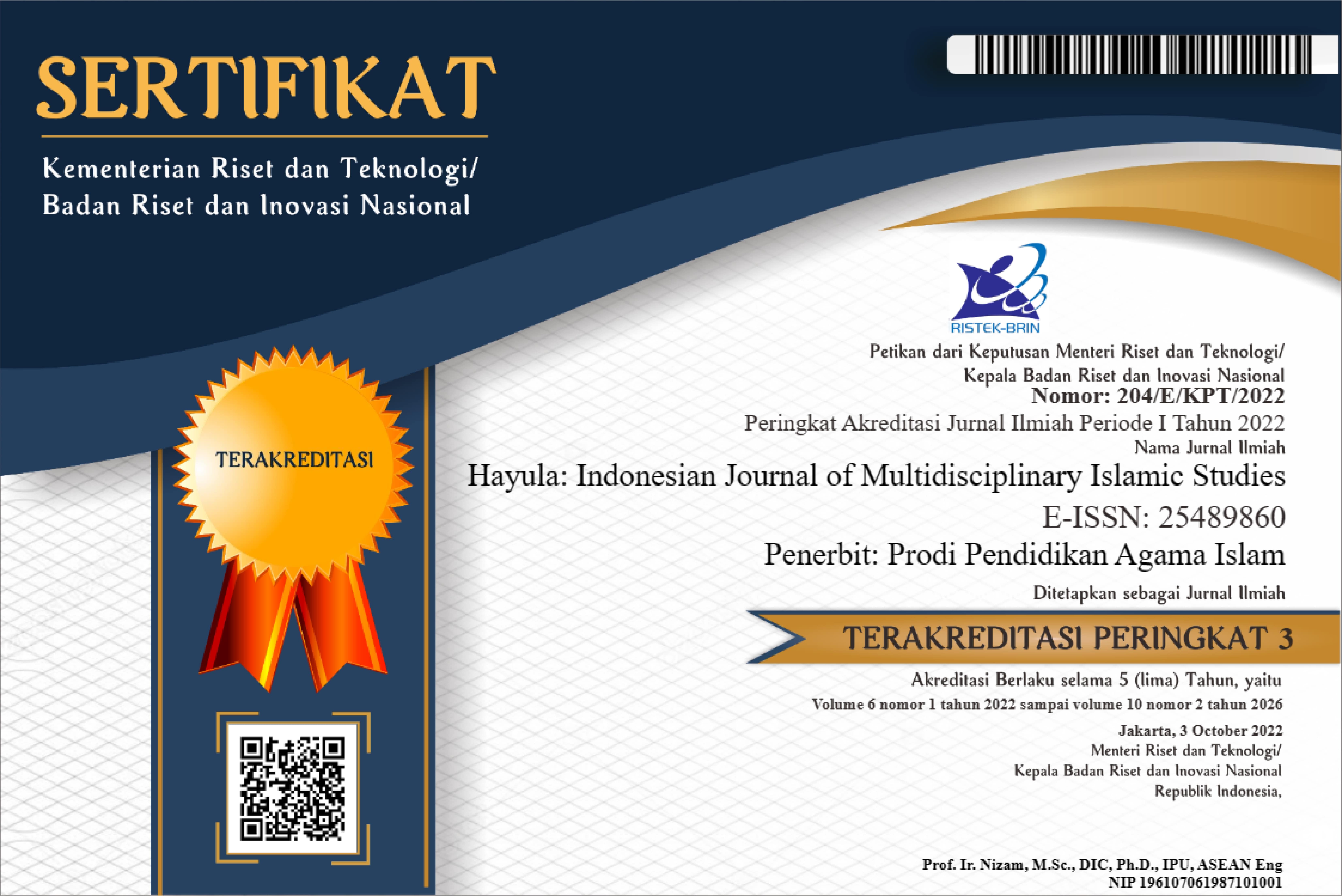Framing of Health Communication in Islamic Religious Education in New Media
DOI:
https://doi.org/10.21009/004.2.03Keywords:
health communication, media literacy, new mediaAbstract
Health communication is needed by the Indonesian people. Islamic education greatly facilitates all forms of health for humanity. This study uses a new media object that is the national media Twitter which contains health information in 2019. The research problem formulation is how to frame health communication in Islamic religious education in new media? The purpose of this study was to determine the health communication framing in Islamic religious education in new media. Health communication is the art of informing influencing and motivating individuals, institutions and society about important matters in the health sector in improving the quality of life and health of individuals in society. The results of the study, the dimensions of informing, influencing, motivating individuals, and society through multilevel Twitter results. In the personal health information unit, this information is very often shared by the cyber media. However, if it is associated with the healthy behavior of new media users, it is seen to have followed. In public health information units such as sneezing and littering: this information is often shared by new media. Cybermedia users are very following.
References
Adawiyah, Sa’diyah El, Aida Vitayala Hubeis, Titik Sumarti, and Djoko Susanto. 2019. “Strategi Komunikasi Politik Dalam Meraih Kepemimpinan Daerah.” Jurnal Metacommunication 4(1).
Al-samydai, Mahmood Jasim, Ihab Ali Qrimea, Rudaina Othman, Yousif Ali, and Kamal Aldin. 2020. “THE IMPACT OF SOCIAL MEDIA ON CONSUMERS ’ HEALTH BEHAVIOR TOWARDS CHOOSING HERBAL COSMETICS.” Journal of Critical Reviews ISSN- 7(9):1171–76.
Alimron, Alimron. 2019. “Penerapan E-Learning Dalam Proses Pembelajaran Pada Program Studi PAI Universitas Islam Negeri Raden Fatah Palembang.” Hayula: Indonesian Journal of Multidisciplinary Islamic Studies 3(1):105–20.
Amali, Mushlihin. 2019. “From Politics to Education: Nurcholish Madjid and the Reform of Education In Indonesia.” Hayula: Indonesian Journal of Multidisciplinary Islamic Studies 3(1):17–24.
Anon. 2019. “Cuci Tangan Pakai Sabun, Sederhana Tapi Dampaknya Luar Biasa.”
Arsad, Syahiza, Roshima Said, Haslinda Yusoff, and Rahayati Ahmad. 2020. “Ownership Structure and Islamic Corporate Social Responsibility Disclosure : Empirical Evidence from the Shari ’ Ah Compliant Companies in Malaysia.” 11(12).
Aulia, Rihlah Nur, Dian Elvira Nanda Isnaini, and Umi Khumairoh. 2017. “Pengelolaan Lingkungan Berbasis Pesantren (Studi Kasus Di Pondok Pesantren Nurul Hakim Lombok).” Hayula: Indonesian Journal of Multidisciplinary Islamic Studies 1(2):119.
Drentea, Patricia, Melinda Goldner, Shelia Cotten, and Timothy Hale. 2014. “The Association Among Gender, Computer Use, and Online Health Searching, and Mental Health.” Information, Communication & Society 11, No.4:509–25.
Goldner, Melinda. 2016. “How Health Status Impact The Types of Information Consumers Seek Online.” Information, Communication & Society 9(6):693–713.
Hadiyanto, Andy, Cendra Samitri, and Siti Maria Ulfah. 2020. “Model Pembelajaran Bahasa Arab Multiliterasi Berbasis Kearifan Lokal Dan Moderasi Islam Di Perguruan Tinggi Negeri.” Hayula: Indonesian Journal of Multidisciplinary Islamic Studies 4(1):117–40.
Han, Xuehua, Juanle Wang, Min Zhang, and Xiaojie Wang. 2020. “Using Social Media to Mine and Analyze Public Opinion Related to COVID-19 in China.” International Journal of Environmental Research and Public Health.
Lotherington, Ann Therese, Aud Obstfelder, and Kari Dyb. 2010. “New Information and Communication Technologies in Healthcare Work and Organization.” Information, Communication & Society 13:446–65.
Mansir, Firman and Abdul Karim. 2020. “Islamic Education Learning Approaches in Shaping Students’ Emotional Intelligence in the Digital Age.” Hayula: Indonesian Journal of Multidisciplinary Islamic Studies 4(1):67–86.
Maslen, Sarah and Deborah Lupton. 2019. “Enacting Chronic Illness with and through Digital Media: A Feminist New Materialist Approach.” Information, Communication & Society.
Nurdin, Nurdin. 2017. “To Research Online or Not to Research Online : Using Internet-Based Research.” Indonesian Journal of Islam and Muslim Societies 7(1):31–54.
Pulido, Cristina M., Laura Ruiz-eugenio, Gisela Redondo-sama, and Beatriz Villarejo-carballido. 2020. “A New Application of Social Impact in Social Media for Overcoming Fake News in Health.” International Journal of Environmental Research and Public Health.
Rahim, Afiq Izzudin A., Mohd Ismail Ibrahim, Faizul Nizam A. Salim, Mohd Ariff, and Ikram Ariffin. 2019. “Health Information Engagement Factors in Malaysia : A Content Analysis of Facebook Use by the Ministry of Health in 2016 and 2017.” International Journal of Environmental Research and Public Health.
Said, Mohamed Mohamed Tolba, Krishnan Umachandran, and Abdul Ghafar Don. 2018. “Innovation in Islamic Education.” Hayula: Indonesian Journal of Multidisciplinary Islamic Studies 2(2):117–28.
Schillinger, Dean and Deepti Chittamuru. 2020. “From ‘ Infodemics ’ to Health Promotion : A Novel Framework for the Role of Social Media in Public Health.” COMMENTARY 1–4.
Setiawan, Iwan Setiawan. 2018. “Islam Dan Nasionalisme: Pandangan Pembaharu Pendidikan Islam Ahmad Dahlan Dan Abdulwahab Khasbullah.” Hayula: Indonesian Journal of Multidisciplinary Islamic Studies 2(1):1–16.
Suprasetio, Arip, Sari Narulita, and Humaidi Humaidi. 2019. “Konstruksi Baru & Pengembangan Wisata Religi Di DKI Jakarta.” Hayula: Indonesian Journal of Multidisciplinary Islamic Studies 3(2):157–72.
Zahrah, Aminatuz dan Achmad Fawaid. 2019. “Halal Food Di Era Revolusi Industri 4.0: Prospek Dan Tantangan.” Hayula: Indonesian Journal of Multidisciplinary Islamic Studies 3(2):121–38.
Downloads
Published
How to Cite
Issue
Section
License
Authors who publish with this Journal agree to the following terms:
- Author retain copyright and grant the journal right of first publication with the work simultaneously licensed under a creative commons attribution licensethat allow others to share the work within an acknowledgement of the work’s authorship and initial publication of this journal.
- Authors are able to enter into separate, additional contractual arrangementfor the non-exclusive distribution of the journal’s published version of the work (e.g. acknowledgement of its initial publication in this journal).
- Authors are permitted and encouraged to post their work online(e.g. in institutional repositories or on their websites) prior to and during the submission process, as it can lead to productive exchanges, as well as earlier and greater citation of published works.
Users/public use of this website will be licensed to CC BY







